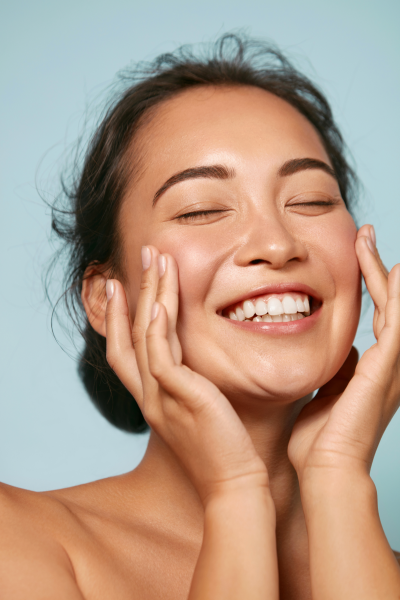Skin Care Ingredients and Aging
Written by Dr. Smita Ramanadham.
Table of Contents
ToggleAging is natural.
Often, we get into the mindset that we want to stop aging altogether, but our years give us experiences and life lessons and we don’t want to erase that. It would just look a little weird if we all looked like we were in our teenage years. A good way to reframe this is to make our goal to age gracefully with healthy skin.
Channel your inner Jennifer Lopez, Jennifer Aniston, or Sandra Bullock. These women have amazing skin and have aged naturally and beautifully but they don’t look like they are 20 years old.
During aging, changes occur to our skin.
Without getting too much into the science and nitty gritty, I think it’s important to understand the basic concepts to better understand why we recommend certain skin care over others. So here we go. The outer layer of skin, called the epidermis, thins, making skin fragile and almost transparent. Melanocytes (the cells that give our skin it’s color) decrease in number but increase in size resulting in changes to our skin tone and irregularities.
The connective tissue of the skin changes resulting in decreased strength and elasticity of the skin causing skin to become loose and wrinkles to form. The blood vessels change, as well, which can cause more bruising. Oil producing glands produce less oil so skin becomes drier and rougher.
These are universal changes but as we’ve seen, some people age better than others. This is because aging also depends on our genetics and on environmental factors such as smoking and sun exposure. Exposure can create damaging free radicals in the skin that cause premature aging and wrinkles, or they can cause direct damage to elastin and other molecules within the skin.
This translates to more wrinkles, uneven skin tone, and an unhealthy leathery appearance. The important thing to remember is that while aging is normal and the changes that occur to our skin is normal, aging, an uneven skin tone, or damage caused by smoking or sun exposure are quite different and is not “normal” aging.
So, what can we do to improve the health of our skin and improve how well we age?
Anything we do must not only help us age well moving forward but undo years of damage that has already been done. I always tell my patients that there are literally only two products that you should incorporate to your medical skin care routine to age well and help with fine lines or wrinkles. You probably already know the answer to this if you know me or follow me on Instagram but the answers are sunscreen and a retinol or other vitamin A product. Let me explain why.
Sunscreen protects us from the damaging effect of UV ray exposure.
As we discussed, these UV rays damage our skin and lead to premature aging. It also, more importantly, increases your skin of skin cancer. It’s important to use a sunscreen that is broad-spectrum meaning it protects against UV A and UV B rays. It should be a minimum of a SPF of 30 based on recommendations from the American Academy of Dermatology.
It should also be worn every single day regardless of the weather or if you are indoors or outdoors. I cannot even count the number of times people tell me they wear sunscreen when they will be outside, but they typically go straight from home to work so there’s no need for it.
Well in actuality, UV rays penetrate clouds, glass and windows so you will be exposed unless you spend your entire day in a dark room or under a rock. Sunscreen should be applied every 2 hours, especially if you are outdoors. Other important things to remember, sunscreen in your makeup is not enough. Oftentimes, these SPF ratings are overestimated and based on testing a thick layer of the product, definitely not the small amount we actually apply.
Most makeup is not broad spectrum, so while you might have protection against UV B rays, you are not protected from UV A rays which are very damaging. So basically, take the extra 2 seconds and apply a separate sunscreen before you begin your makeup routine.
Now on to retinols.
Retinol is a type of vitamin A and is the workhorse for skin health. It is found in some of the best skin care products. It helps build collagen, it unclogs pores, it improves skin tone and evens out blemishes. It helps with acne, fine lines, and wrinkles. It thickens skin as well. All of those changes we saw earlier with thinning of the skin and loss of elasticity can be improved with retinol or vitamin A use.
It’s important here to use a product that is medical grade. You want a strong enough concentration that you actually see the benefits of the product. It is common to have an acclimation period so I often have my patients gradually increase their dosage over the course of 6-8 weeks.
This eases your skin into retinol use. Some people still have strong reactions and we can try other forms like retin-A or tretinoin. Despite this initial period, the end result is well worth it. It’s actually quite amazing when I see my Botox or filler patients in the office that have been using retinol. I can tell just by how the needle feels when I inject whether they are on a good skin care regimen because their skin is notably thicker. Many patients seek out a plant derived retinol alternative. Depending on the patient, a plant derived retinol alternative can be a fine option to pursure.
Once you’ve mastered the use of both a sunscreen and a vitamin A derivative, the rest is an added bonus. Antioxidants, such as vitamin C, help improve the brightness of your skin and help with those free radicals I mentioned earlier. Vitamin C is a natural wonder that helps our skin dramatically. Who would think that simply consuming vitamin C naturally would have a positive impact on your skin? Yet, it does! There are various sources of vitamin C and various ways vitamin C is applied. Vitamin C is found in a wide variety of foods, and vitamin C is also found in a variety of skincare products. Growth factors help restore skin health and function, as well as having anti-aging effects. Hyaluronic acid (HA) has a lot of hype these days as well.
This is a substance normally found in our skin that helps with hydration. It is also the primary ingredient used in many of our dermal fillers. Topical HA typically comes in a serum and is a great moisturizer for our skin.
There are lot of other ingredients that you’ll find in skin care and it can get pretty overwhelming, especially when trying to decipher if it actually works and is needed. Some products help with uneven skin tone, others with dehydrated skin, some with dark spots and others with wrinkles. Don’t be overwhelmed! Start with sunscreen and retinol and add in the extra if it works for you. Be religious about this and make it part of your routine like flossing and brushing your teeth.
I promise, once you start seeing results, you’ll wonder why you didn’t start sooner or why you wasted your time and money on department store or drug store brands.
Questions and Answers
What are the ingredients for skin care?
Alpha Hydroxy Acid
Beta Hydroxy Acid
Elastin
Emollient
Humectant
Hydroquinone
Hyaluronic Acid
Jojoba Oil
Retinoids
Vitamin E
Zinc Oxide
What are the 5 cosmetic ingredients?
Alpha Hydroxy Acid
Beta Hydroxy Acids
Color Additives
Diethanolamine
Fragrance
What ingredients are good for face?
Retinol diminishes wrinkles and aging signs found in the skin texture, Hyaluronic acid provides a radiant, hydrated complexion. Niacinamide enhances skin tone and texture, while peptides fortify the skin barrier. Enhancing the skin tone can help result in a youthful healthy appearance. BHA/PHA exfoliate, promoting clearer skin. Plant-based squalane offers deep skin hydration.
Salicylic acid is a good ingredient for the face that has been known to help with acne. Benzoyl peroxide is also a substance which is known to help acne as well. Salicylic acid aids skin exfoliation by breaking down the adhesive bonds between cells and dead skin. Salicylic acid helps in facilitating a smooth removal of dead skin. Salicylic acid smoothens rough dead skin, unveiling a fresh, healthy complexion. The dose of salicylic acid depends on the product and use. Salicylic acid is available OTC.
Glycolic acid is another ingredient that is good for your face. With proper application, Glycolic acid helps to hold dead skin cells together. Glycolic acid is known to help with dry skin and can be found in peels and masks as well. Glycolic acid is a clear, colorless substance found in many products. Glycolic acid is a mild chemical exfoliant preferred by many women that report great benefits in skin texture after using glycolic acid.
Amino acids are another substance that many have incorporated into their skin care routine. Amino acids are known to help with dry and flaking skin.
What ingredients make your skin look younger?
 Niacinamide is a derivative of vitamin B-3 (niacin), commonly found in serums, masks, moisturizers, and wrinkle creams. Its potential benefits include reducing signs of aging and skin discoloration. L ascorbic acid is also a popular substance which helps refine and smooth skin texture which results in a younger looking appearance.
Niacinamide is a derivative of vitamin B-3 (niacin), commonly found in serums, masks, moisturizers, and wrinkle creams. Its potential benefits include reducing signs of aging and skin discoloration. L ascorbic acid is also a popular substance which helps refine and smooth skin texture which results in a younger looking appearance.
Alpha hydroxy acid also helps make your skin look younger and with a healthier skin texture. Alpha hydroxy acid is considered a skin exfoliant which helps minimize the impact of dead skin cells. Some have also suggested that it helps with uneven skin tone.
Lactic acid is a substance which helps smooth rough areas and remove dead skin cells. Lactic acid can be found OTC in a variety of products. When used consistently and heavily, lactic acid can penetrate the skin deeply and can result in fewer wrinkles and smoother skin. Lactic acid is also popular because it works well on sensitive skin. In addition to skincare, lactic acid has also been known to successfully treat skin infections in newborns.
Hyaluronic acid is a substance that is found naturally in our bodies in addition to various products as well. Hyaluronic acid helps with hydration and can help to reduce wrinkles in the skin. Many women rely on, and are very happy with, products that include hyaluronic acid. Hyaluronic acid is great for moisturizing and can be found reliably in many products over the counter.
Contact SR Plastic Surgery Today
By exploring the potential of powerful skincare products, you may reduce the likelihood of requiring extensive surgical procedures to achieve a more youthful appearance. While the prospect of future innovations is exciting, let’s first assess the transformative capabilities of advanced skincare solutions.
Interested in experiencing the benefits of medical-grade skincare? Reach out to me today for more information!
